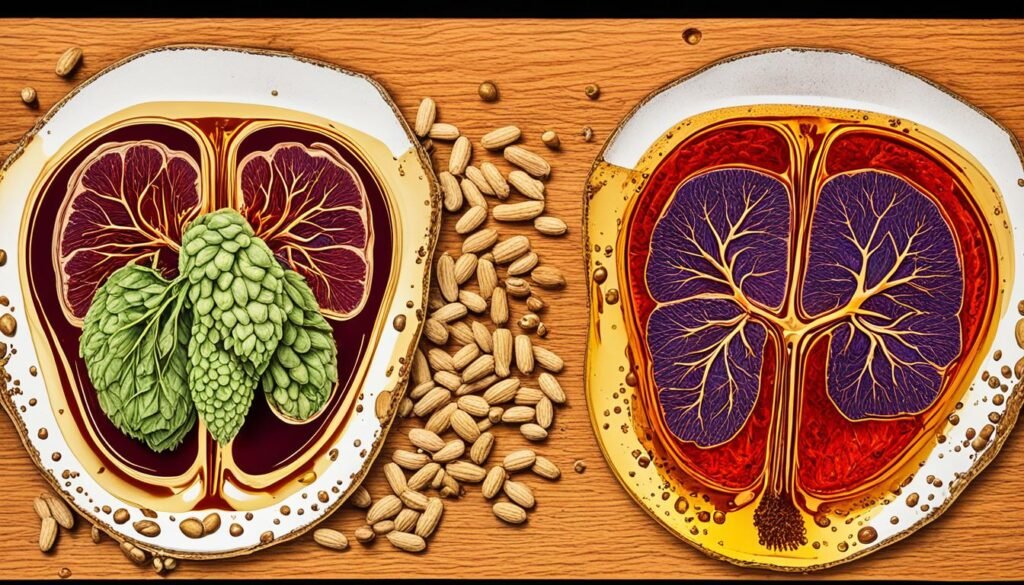For many, enjoying a cold beer at the end of the day is a cherished routine, but concerns regarding liver damage from alcohol loom large in such decisions. The question often arises: can a daily beer coexist with liver health? Scientific research presents a nuanced picture, shedding light on the impact of alcohol on liver function. This article delves into whether moderate consumption aligns with best practices for liver health.
Key Takeaways
- Moderate drinking might offer some health benefits, yet poses potential risks.
- Understanding the threshold between moderate and heavy drinking is crucial.
- Liver function is significantly affected by alcohol intake.
- Consistent heavy drinking is associated with serious health conditions.
- Adherence to recommended guidelines aids in maintaining liver health.
- Medical advice should be sought to personalize alcohol consumption plans.
Understanding Alcohol and Liver Function
The liver’s critical role in metabolizing alcohol implicates every glass of beer as a determinant of hepatic well-being. With the liver acting as the body’s natural filter for toxins, including ethanol from spirits, the effects of moderate alcohol consumption on liver function are a focal point of contemporary health discussions. Notably, the stance that one beer a day could influence liver health draws on both scientific findings and ongoing debates within the medical community.
The dual-faced nature of alcohol on the liver presents a complex picture. On the one hand, some research signals that moderate drinking might confer certain protective benefits against cardiovascular illnesses. On the other hand, regular intake beyond moderation burdens the liver with excessive stress, potentially escalating to alcoholic fatty liver disease or the more serious condition of cirrhosis.
Understanding the link between alcohol and liver health not only underscores the balance required in consumption but also the body’s remarkable yet limited capacity for detoxification and repair.
In light of the nuanced effects of alcohol, examining alcohol and liver function reveals a spectrum where moderation is key. The following table outlines the potential impacts of alcohol consumption on liver health, its processing, and the balance necessary to maintain wellbeing.
| Drinking Level | Liver Function | Potential Health Outcomes |
|---|---|---|
| Non-Drinking | Normal Processing | Baseline liver health |
| Moderate (1 beer/day) | Efficient Metabolism | Potential for maintenance or slight improvement in liver health |
| Excessive | Stressed Detoxification | Risk of fatty liver disease, cirrhosis, and other liver-related conditions |
| Binge Drinking | Overwhelmed | Heightened risk of acute liver strain and long-term damage |
Comprehending the effects of moderate alcohol consumption, particularly in the form of beer, necessitates a careful juxtaposition of potential health benefits versus risks. To promote optimal liver health, it is essential for individuals to strike a balance that aligns with both lifestyle and medical counsel.
Is 1 beer a day good for your liver?
Unpacking the relationship between alcohol and liver health requires a nuanced understanding of how moderate alcohol consumption interacts with our bodies. The conversation around benefits of moderate alcohol intake often revolves around the pros and cons that such habits have on various aspects of health, including liver function.
Exploring the Effects of Moderate Alcohol Consumption
Moderate alcohol intake is sometimes heralded for its possible protective qualities against certain diseases, a topic that remains under continuous research. Beer, as a source of fermented compounds, may contribute positively to gut health and increase bone mineral density, thus highlighting the benefits of moderate alcohol intake. Simultaneously, the relaxation and euphoria often associated with moderate drinking come with caveats about their impact on liver function.
Analyzing the Impact of Single Daily Beer on Liver Health
The daily ritual of enjoying a single beer is considered by some to be a form of moderate consumption. That said, light to moderate beer drinking has its advantages, such as potential improvements in heart health and glycemic control. Yet medical advisors are prompt to point out the potential threats to liver health if moderation is surpassed, elevating the risk of ailments like fatty liver disease and cirrhosis. Here, the critical variable is the quantity— where even a slight increase can have cumulative, negative effects on moderate alcohol consumption.

Medical Perspectives on Daily Beer Intake
Seeking medical advice on moderate alcohol consumption offers a grounded perspective on balancing enjoyment and health. A concessional beer per day may align with a reduced risk of certain non-liver-related diseases. However, the unanimity among health professionals is on the importance of abiding by recommended guidelines—tailored to reduce the chances of long-term liver damage.
In a culture that often celebrates the casual consumption of alcohol, understanding these nuances is crucial for maintaining liver health and overall well-being. As the saying goes, moderation in all things—beer included—is essential for a healthy life.
The Link Between Beer and Overall Health
As we delve deeper into the effects of beer on one’s wellness, it becomes imperative to consider the full breadth of its influence, from the nutritional value of beer to the health risks of alcohol. Beer, a staple in many cultures, is often savored for its flavor and its role in social settings, yet understanding its impact on health is essential.

Assessing the Nutritional Components of Beer
The grain-based origins of beer lend it a surprising variety of nutrients. It carries a selection of B vitamins, including niacin and riboflavin, important for energy metabolism in the body. Essential minerals found within beer, such as magnesium and phosphorus, contribute to its modest nutritional profile. Furthermore, beer encompasses a small fraction of protein. Light beer variants offer a further option, bringing forth a beverage with lower caloric and alcohol content, suitable for those mindful of their intake in the interest of beer and liver health.
Debunking Myths: Beer Benefits Versus Health Risks
Contrary to popular beliefs, the consumption of beer carries both potential benefits and risks. Moderate alcohol intake has been associated with improved bone health and a potential for healthier gut flora due to the fermentation process involved. However, the overarching narrative around the health risks of alcohol cannot be ignored. Excessive or even moderate drinking has been linked to negative consequences such as cognitive impairment and increased cancer risk. This dichotomy underscores the importance of a balanced outlook regarding alcohol consumption.
Comparative Risks: Beer Consumption Versus Other Alcohols
The comparative analysis of beer against other types of alcohol reveals nuanced differences. Beer’s lower alcohol by volume (ABV) may paint it as a safer option, yet this distinction requires careful consideration. While beer may bring certain nutrition to the table and have milder diuretic effects than beverages like wine or spirits, the line between safe and harmful levels of consumption remains clear and should be respected. The comparative health risks of alcohol types all point toward one truth—moderation remains the guiding principle.
| Alcohol Type | Typical ABV | Caloric Content | Nutritional Benefits | Health Risks |
|---|---|---|---|---|
| Beer | 3-6% | Varies based on beer type | B vitamins, minerals | Liver disease, dependence |
| Wine | Around 12% | Higher than beer | Antioxidants like resveratrol | Cardiomyopathy, cancer risks |
| Spirits | 20-40% | High, especially in cocktails | Minimal | Liver disease, high blood pressure |
Conclusion
In wrapping up our discussion, it’s pivotal to acknowledge that including a single beer in your daily ritual doesn’t have to be detrimental, provided it is consumed within the ambit of responsible drinking. This approach aligns with the best practices for liver health, ensuring that alcohol is enjoyed without overburdening this vital organ. Current studies offer a glimmer of the positives associated with moderate beer consumption; however, they’re overshadowed by the larger narrative which emphasizes restraint and the impact of alcohol on liver function.
Maintaining a healthy liver should be at the forefront of health considerations. To uphold this, an individual must be mindful of the prevailing guidelines that cap alcohol intake at moderate levels. The accumulation of even seemingly insignificant daily alcohol amounts can strain the liver over time, highlighting the importance of recognizing the cumulative effects of alcohol on the body. Hence, keeping the liver in prime condition is not just about the quantity of alcohol but also about the consistency of consumption.
Ultimately, factoring in alcohol’s role in your health routine calls for a conversation with a healthcare professional. This measure becomes all the more essential when navigating the landscape of lifestyle choices that impacts liver health. Tailoring alcohol consumption to one’s unique health status and risks requires a nuanced understanding that extends beyond general recommendations. By doing so, individuals can foster a balance that contributes to enduring liver vitality and overall well-being.
FAQ
Can one beer a day lead to liver damage?
While moderate alcohol consumption, such as one standard drink a day, can fit into a healthy lifestyle, it’s important to remember that excess intake can lead to liver damage. Light to moderate consumption may not significantly impact liver health for most people, but individuals should be wary of their overall alcohol intake throughout the week to avoid potential harm.
Are there any benefits to drinking a single beer daily?
Some studies suggest that moderate alcohol intake, including one beer a day, may be associated with certain health benefits, such as a potentially lower risk of heart disease and improved insulin sensitivity. However, these potential benefits should not be a reason to start drinking if you abstain, and it is essential to consume alcohol in moderation.
How does alcohol affect liver function?
The liver is responsible for metabolizing alcohol, and consuming alcohol places a load on this vital organ. While moderate alcohol consumption might not significantly impair liver function, heavy drinking can lead to liver inflammation, fatty liver disease, or more serious conditions like cirrhosis and alcoholic hepatitis.
What are the best practices for liver health regarding alcohol consumption?
The best practices for liver health include drinking in moderation, adhering to recommended guidelines of no more than two drinks per day for men and one drink per day for women, and avoiding binge drinking. Always consult with a healthcare provider for personalized advice on alcohol consumption.
What are the effects of moderate alcohol consumption on overall health?
Moderate alcohol consumption has been linked with certain health benefits, such as potentially reduced risks for heart disease, type 2 diabetes, and some forms of dementia. However, even moderate drinking can have adverse effects, including negative impacts on brain function and an increased risk for various cancers.
What nutritional value does beer have?
Beer contains B vitamins, minerals like magnesium and phosphorus, and a small amount of protein due to its grain and yeast content. Despite these components, beer should not be considered a significant source of nutrition in comparison to a balanced diet of whole foods.
Is beer safer to drink than other types of alcohol?
Beer is often perceived as less harmful because of its lower alcohol content compared to spirits or wine. However, when consumed above moderate levels, it can lead to the same health risks, including liver damage, chronic diseases, and other alcohol-related health issues.
Is moderate beer intake better for your liver than heavy drinking?
Yes, moderate intake – defined as up to one drink per day for women and up to two drinks per day for men – is generally better for liver health than heavy or at-risk drinking. Heavy drinking greatly increases the risk of developing liver disease and other health complications.
